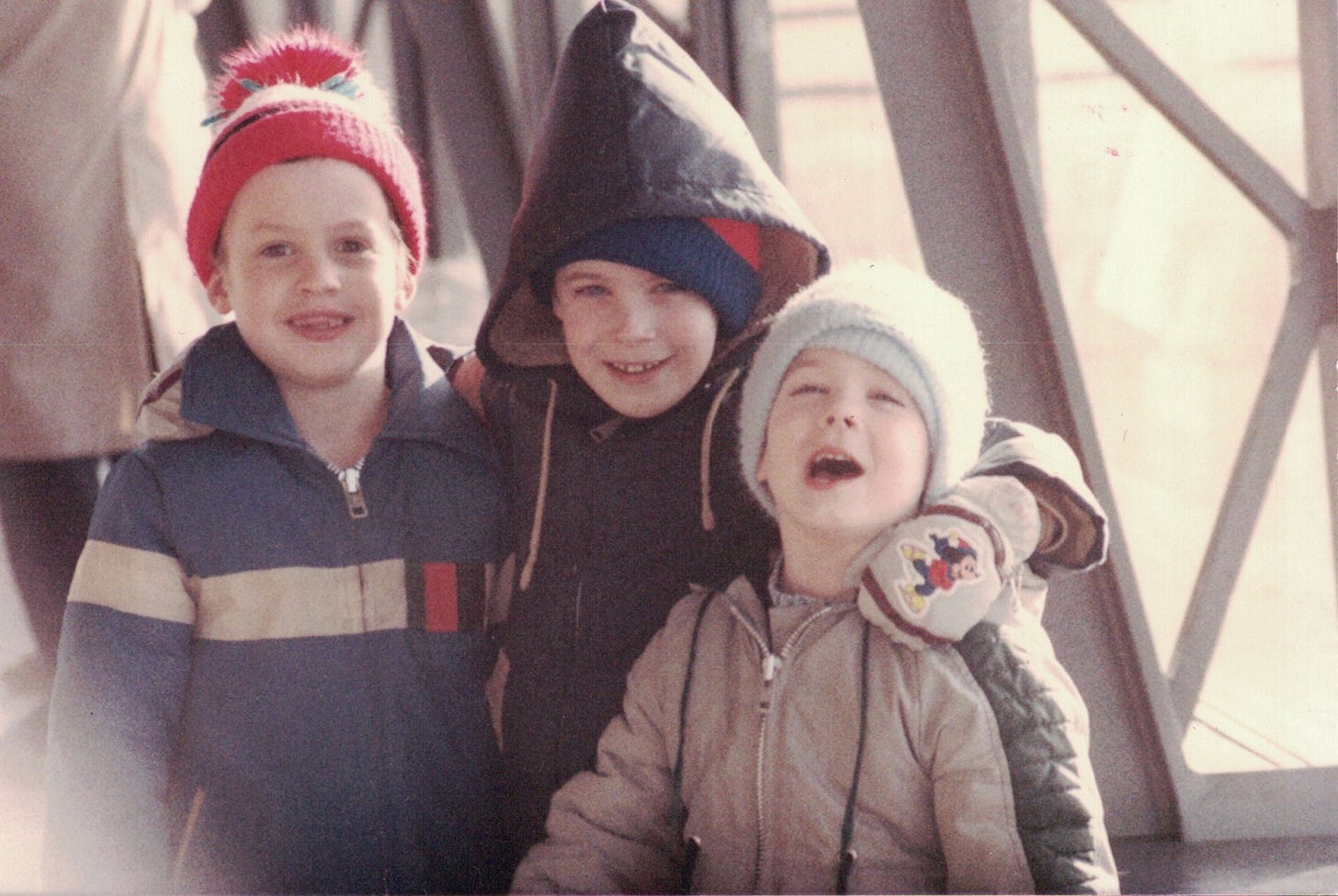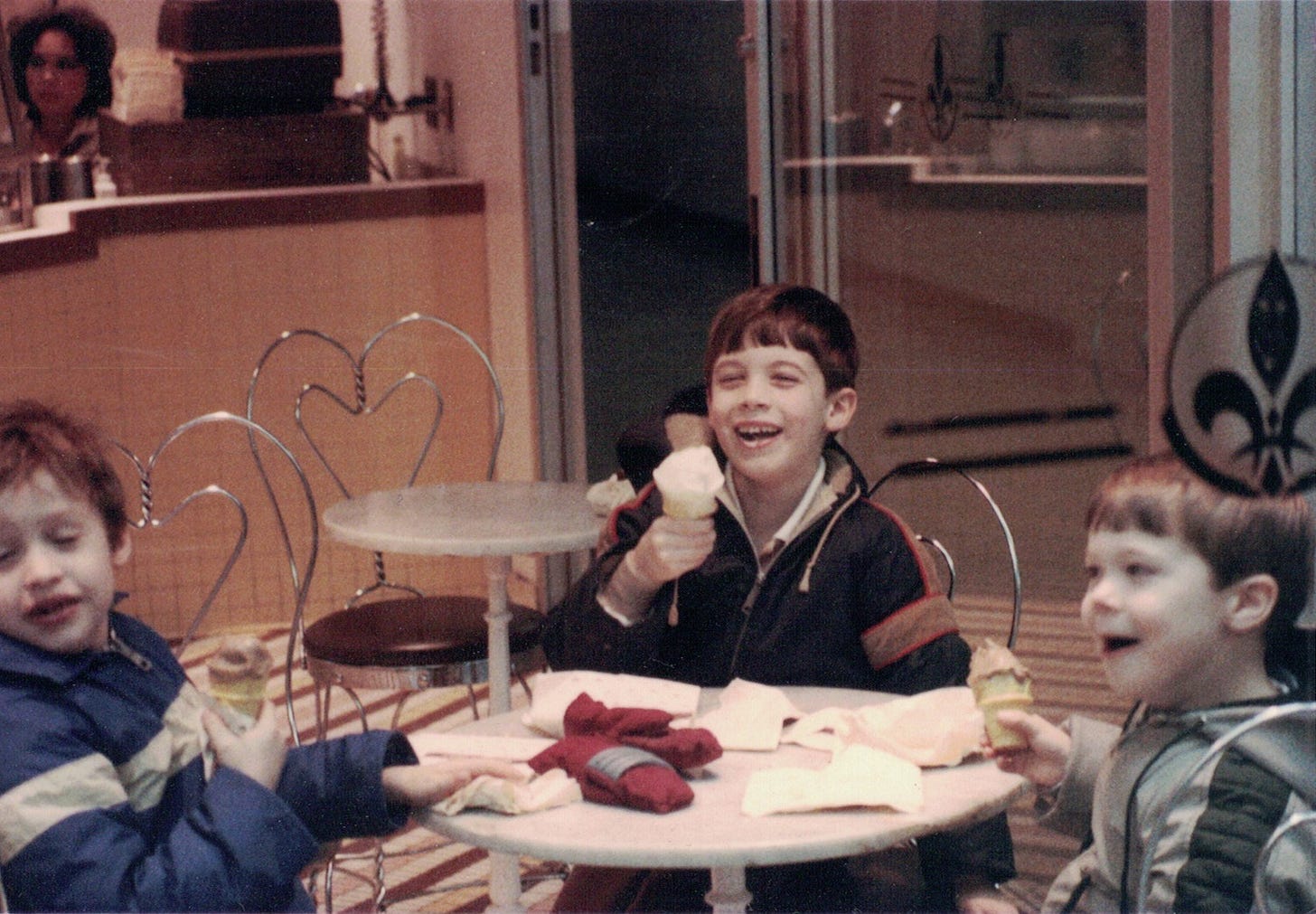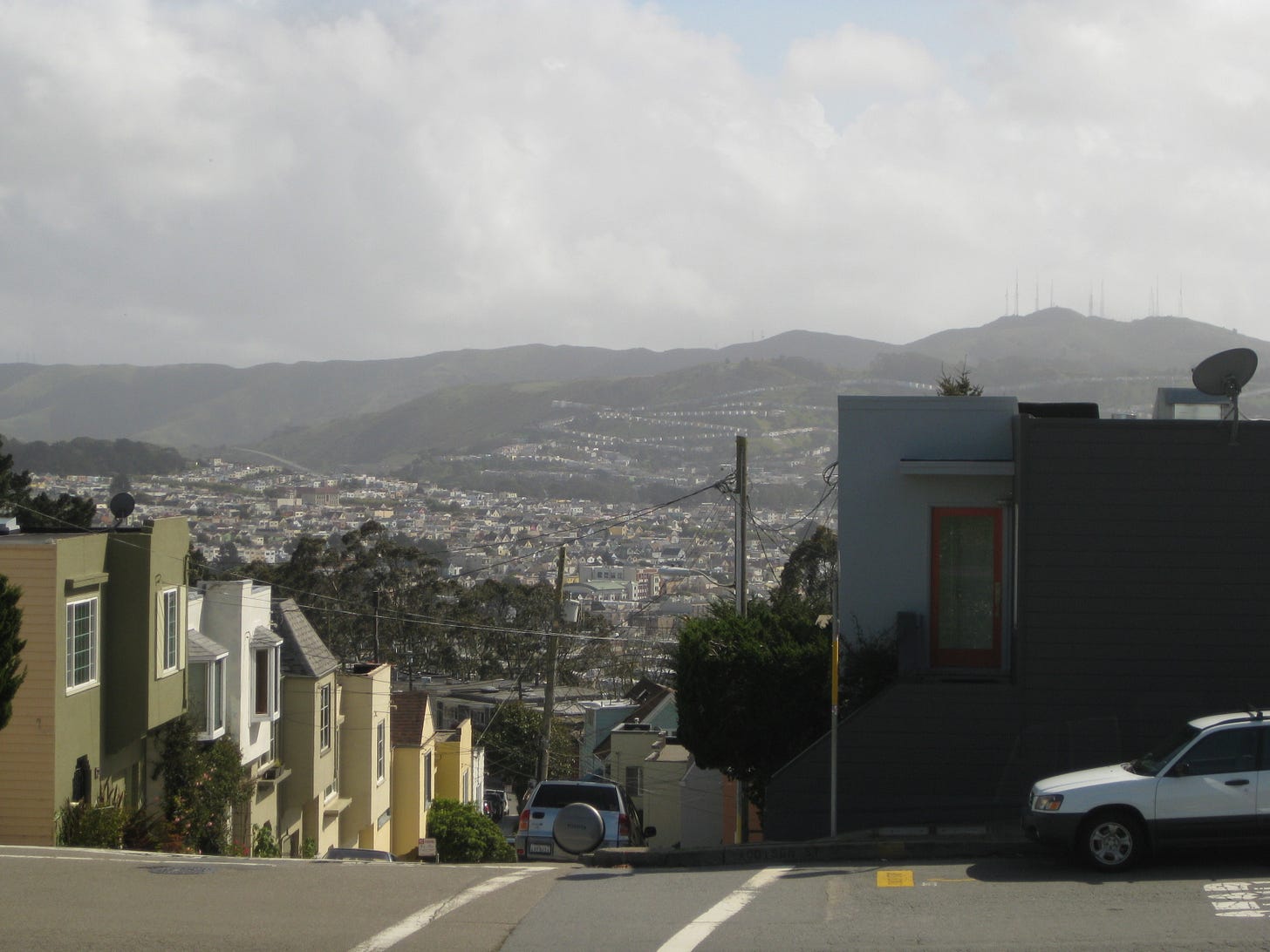My Fellow Shennyer:
On a walk around Oakland last month with my friend Michael, he wondered how to stay connected online now that Twitter’s dead. ‘Well, I’ve got this newsletter,’ I said, and it was the first time, weirdly, I thought of Shenny as social media.
What does it mean that plenty of people have something to tweet (still! even after all of E. Musk’s garbage, people still want to give him content to perpetually own!) but few have something to substack? The length must have something to do it. I don’t have anything worth saying. It’s as universally human a sentiment as I’m hungry but it’s a lie. It didn’t stop folks from going on Twitter (where, as I’ve written about before, everyone is wrong).
Saying something across 200, 500, 1000 words might take more thought, but not as much as you might think. Did you used to get those holiday cards that came with a letter updating you on that family’s year? Facebook burned all those to ashes, most likely, and sure some dads behind them got too pompous, and there was always a stretch to make one kid’s soccer tournament seem like Fischer vs. Spassky. But I read every one we got, even from people I couldn’t remember.
Were they good? What’s ‘good’? Looking back, I’d’ve never preferred fewer letters, much less none at all. After 22 issues, I’ve learned from Substack that not everything has to be good all the time—or meaningful or life-changing or heartbreaking or ‘THIS!’-ifying. Better to have everything be just happening all the time. More of more.
Yours:
Dave
Endorsements
1. Bleach & Bluing
Sometimes when I stay at somebody’s house, I’m given a towel that’s navy, or burgundy, or moss green, or brown, and sometimes these towels smell musty and dank, and I wonder: Why do people make bath towels in colors? You can’t bleach burgundy. This is why N & I are a white towel, white bedsheets household: you pour 1/4 cup of bleach in the washer with your whites and know it’ll handle not just stains but mustiness.1 Now, linens take on this yellowed tinge over time, even with bleach, and to solve that problem, enter bluing:
Like blue-ing, what Tobias Fünke does to himself. Bluing does for fabric what a higher Kelvin temperature does for lamplight. Dilute half a teaspoon in the washwater and it’ll ‘tint’ your whites. They won’t look blue, they’ll look new. What I do, week after week, is a rhythm of bleachwash, bleachwash, bluingwash, repeat. Clean sheets forever.
2. We Both Laughed In Pleasure, the Selected Diaries of Lou Sullivan
‘I love myself a lot. I love to enjoy the feeling of being alive + having a body + secrets.’ That’s a line from the Milwaukee years in the diaries of Lou Sullivan, a writer and activist in San Francisco in the 70s and 80s. Sullivan self-identified as a ‘female-to-gay-male transsexual’; he wanted his whole life to be the gay man of his dreams, and then, in SF, with surgery and hormones, he became one. His diaries have plenty of despair and tragedy—this is the only book in distant memory that’s made me cry—but is mostly full of love and pleasure and joy and comedy. Here’s my favorite part:
Charles, Jeffrey & I also went to the Wreck Room, the gay leather S&M bar. I've always been scared to go there, being a girl, but once inside wasn't. Mostly older guys in motorcycle & cowboy getup & no one paid much attention to me. And after a while I began seeing how un-hard the whole scene was. Like they had some kind of raffle & all the hard guys were looking at their ticket to see if they won & then they announced everyone with a motorcycle cap or a cowboy hat on could get a free drink. How high school!
Sullivan’s position as transman / outsider (but desiring insider) so easily shows up gay culture and gay masculinity, exposing their sillinesses and hypocrisies better than those of us fully in/of that culture can. Which like duh: read more trans people, fellow cis folks. Buy your copy here.
How to Forget Your Friends
Here is a photo of me and some other people:
Aren’t we having fun? Young pals smiling, arms around shoulders, braving what must have been a very cold day. I lost my two front teeth at age 6, marking this likely Jan-Feb 1985. How old are the other boys, who with those eyes must be brothers? I couldn’t tell you. I can’t even tell you their names.
I got this photo a few years ago, Mom having emptied out a drawer somewhere and come across them. Did she mail them to me or hand them over on a visit? I can’t remember. I am, as we’ll see, a savant at forgetting, but when I looked at this photo I was hit by forgetting’s weight, its sly selectivity. It’s not a function of age; I have fond memories of playing Lincoln Logs with my oft-turtleneck’d preschool friend Rahul, and reading advanced textbooks out in the hall with my kindergarten friend Mike. One year later I’m out on an excursion with friends, and we’re having a great time…
…and I can remember nothing of the day, nothing of those boys, not a name, not a single anecdote from whatever time we spent together. It’s almost like I’m seeing a secret twin live a different childhood than I did, except I remember those mittens on the table, how they made me feel like a Gobot.
I’m bad at names but I never forget a face. I hear this all the time from folks and I’m like, oh good for you. I forget faces like last night’s dreams. Being the sort of person who’s introduced himself to people he’s already met, I apologize and never begrudge this of others, you can reintroduce yourself to me anytime, you can ask me my name again after I’ve told it to you.
It’s fine.
Many disagree. Many see it as rudeness or narcissism, the forgetting a sign of the person’s disinterest, or unwillingness to remember. And hell, maybe it is. I’ve long feared that phantom of my future self, an absent-minded dotard who can articulate Barthes’s tactics contra the doxa in The Neutral but can’t remember what his partner asked him to pick up at the store.
The mind is never fully absent. It’s just that one of the hard things in life is that our mind, and the minds of others, aren’t always where they’re needed.
Chalk it up to more contrarianism that I came, with all this forgetfulness, to a vocation that prizes memory. I should not be writing about my past, because my past is a grey cloud. But I like that cloud, for now. I think of it like Correggio’s Jupiter: shapeless but potent; ugly and full of risk.
In part of that cloud lives my Aunt Olga, my dad’s mom’s brother’s wife, who died a widow in Monongahela, Pa. I’ve got only two memories of her: (1) her house in Maryland somewhere had a bumper pool table in the basement, and (2) once she scolded my mom against setting her purse on the floor, claiming folksily that purses off the floor hold more money.
Is that enough to build an essay around? I’m about to find out, finishing up final revisions this week on ‘Bumper Pool’. Here’s how it starts:
Just once, my family drove to a strange part of Maryland to have Thanksgiving dinner at our Aunt Olga’s house. In her basement was a bumper pool table. I was confused by it, and our family is small, so this memory is a tangle I’ll try to work my fingers around.
What drives me to write into such tangles? I think it’s that I want to map forgetting’s textures, those gaps and vacant holes. Feeling it so often, I want to render the experience of the mind darting around directionlessly, with nothing to grab onto, like the time I called animal control on the robin’s nest above my front door, and for days the mother robin just kept flying in a triangle, from doorway, to treebranch, to electrical wire, door, branch, wire, all the time chirping an alarm I tried to ignore.
The happy news is that memory’s outsourceable. Mom tells me that these are Peggy and Joe Lepp’s sons. Joe was in the Jaycees with my dad. The Lepps used to live in the townhouses by our neighborhood pool, which means these kids would have gone to my same school. Dad thinks one of them was named Jason. Mom thinks they were even at the birthday party I had at McDonald’s.
I’m looking right now at Jason Lepp’s online profile. I’m convinced he doesn’t remember me.
In 2012, I took my first-ever trip to San Francisco to give a reading at the University of San Francisco, which had invited me as part of its Emerging Writers Festival. At the time, I was 2 years into my job at the University of Alabama, and on this afternoon, someone I think was named Eric (a friend of a friend I met at the latter’s birthday party) agreed to drive me to the Mission, where I had a dinner date with another old friend.
Eric was going to drop his car at his house, in a part of town called Glen Park, and then we’d take BART. As we drove up into the hills above San Francisco, I kept gawking out the windows at the view. He stopped us at a park so I could get out and take some pics. I took some pics, mostly of downtown, but then, on the walk back to his car, I snapped this photo:
The hills, I guess, in the distance are what caught my eye? Last week, I came across this photo in a folder buried deep on my laptop, clicked past it and then went back. I couldn’t believe it. This is a photo of the corner of Addison and Farnum, which is an intersection I walk or drive past twice a day. It’s where I pick up the bus, maybe a 90-second walk from where I’m typing these words.
In 2012, I didn’t know how, when, or even whether I’d leave Alabama, and I didn’t know I’d ever live in San Francisco. And I certainly never imagined that the park I stood in that afternoon would one day be ‘my’ park, and that I’d live in a house steps away from it.
The photo above is another document of my not-knowing, my not-yet knowing. It’s like a reversal of forgetting, your unknown future shelved in your mind, like a book you haven’t yet opened.
This week’s natatorium comes recommended from a Shenny subscriber (thanks, R!): the Piscine Pontoise in Paris. I love the translucent roof, which reminds me of the first indoor pool I fell in love with: my Aunt Alma’s. (And like Denise Richards, j’adore une piscine.)
We don’t have one of those fancy front-loading washers, but if you do and if your clothes smell musty, the secret is to leave the door open after emptying the washer. Dry that rubber gasket out before any gunk can thrive there.











Since you asked, I’ve got a Substack at skeletontrivia.substack.com